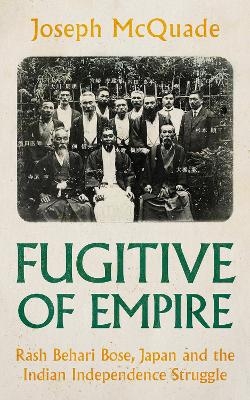
Fugitive of Empire
Rash Behari Bose, Japan and the Indian Independence Struggle
Seiten
2023
C Hurst & Co Publishers Ltd (Verlag)
978-1-80526-042-4 (ISBN)
C Hurst & Co Publishers Ltd (Verlag)
978-1-80526-042-4 (ISBN)
A lively biography of an important Indian revolutionary, from his attempted assassination of the Viceroy to his anti-imperialist activities in exile.
In 1912, Rash Behari Bose made his dramatic entrance into India's anti-colonial freedom movement when he orchestrated a bomb attack against the British Viceroy during a public procession in Delhi. Forced to flee his homeland, Bose settled in Japan, becoming the most influential Indian in Tokyo and earning the affectionate title 'Sensei' among Japanese youth, military personnel and far-right ultranationalists.
Throughout the 1920s and 1930s, Bose remained a perpetual thorn in the side of the British Empire as he built and maintained a global network of anti-colonialists, radicals, smugglers and intellectuals. After siding with Imperial Japan against his British adversaries during the Second World War, Bose died in 1945--just two years before India gained its independence. A complex, controversial and often contradictory figure, Bose has been described as a committed democrat, an authoritarian, an advocate of religious harmony, a Hindu chauvinist, an anti-Communist, a political pragmatist, an idealist, a Japanese collaborator, an anti-racist, a cultural conservative, a Pan-Asianist, an Indian nationalist, and much more besides.
Drawing on extensive archival research in India, Japan and the UK, this refreshing new biography brings to life the largely forgotten story of one of twentieth-century Asia's most daring revolutionaries.
In 1912, Rash Behari Bose made his dramatic entrance into India's anti-colonial freedom movement when he orchestrated a bomb attack against the British Viceroy during a public procession in Delhi. Forced to flee his homeland, Bose settled in Japan, becoming the most influential Indian in Tokyo and earning the affectionate title 'Sensei' among Japanese youth, military personnel and far-right ultranationalists.
Throughout the 1920s and 1930s, Bose remained a perpetual thorn in the side of the British Empire as he built and maintained a global network of anti-colonialists, radicals, smugglers and intellectuals. After siding with Imperial Japan against his British adversaries during the Second World War, Bose died in 1945--just two years before India gained its independence. A complex, controversial and often contradictory figure, Bose has been described as a committed democrat, an authoritarian, an advocate of religious harmony, a Hindu chauvinist, an anti-Communist, a political pragmatist, an idealist, a Japanese collaborator, an anti-racist, a cultural conservative, a Pan-Asianist, an Indian nationalist, and much more besides.
Drawing on extensive archival research in India, Japan and the UK, this refreshing new biography brings to life the largely forgotten story of one of twentieth-century Asia's most daring revolutionaries.
Joseph McQuade is a senior fellow at the Bill Graham Centre for Contemporary International History. A former postdoctoral fellow at the University of Toronto, he is the author of 'A Genealogy of Terrorism: Colonial Law and the Origins of an Idea'. He completed his PhD at the University of Cambridge.
| Erscheinungsdatum | 04.04.2023 |
|---|---|
| Zusatzinfo | 20 Illustrations, black and white |
| Verlagsort | London |
| Sprache | englisch |
| Maße | 138 x 216 mm |
| Themenwelt | Literatur ► Biografien / Erfahrungsberichte |
| Sachbuch/Ratgeber ► Geschichte / Politik | |
| Geisteswissenschaften ► Geschichte ► Regional- / Ländergeschichte | |
| Geschichte ► Teilgebiete der Geschichte ► Wirtschaftsgeschichte | |
| ISBN-10 | 1-80526-042-1 / 1805260421 |
| ISBN-13 | 978-1-80526-042-4 / 9781805260424 |
| Zustand | Neuware |
| Haben Sie eine Frage zum Produkt? |
Mehr entdecken
aus dem Bereich
aus dem Bereich


